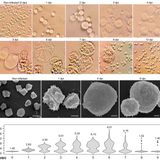RECENT ARTICLES

Virus-induced cell gigantism and asymmetric cell division in archaea
Edited by Alice Telesnitsky, University of Michigan Medical School, Ann Arbor, MI, and accepted by Editorial Board Member Michael F. Summers February 25, 2021 (received for review October 28, 2020)Studies on bacterial and eukaryotic viruses have revealed a range of strategies used by viruses to subdue host cells for efficient virus replication. How archaeal viruses interact with their hosts remains largely unknown. We characterize a new strategy employed by a nonlytic archaeal virus STSV2 to transform its host into a giant virion-producing factory, whereby the virus infection blocks normal...…Edited by Alice Telesnitsky, University of Michigan Medical School, Ann Arbor, MI, and accepted by Editorial Board Member Michael F. Summers February 25, 2021 (received for review October 28, 2020)Studies on bacterial and eukaryotic viruses have revealed a range of strategies used by viruses to subdue host cells for efficient virus replication. How archaeal viruses interact with their hosts remains largely unknown. We characterize a new strategy employed by a nonlytic archaeal virus STSV2 to transform its host into a giant virion-producing factory, whereby the virus infection blocks normal...WW…

A 4,565-My-old andesite from an extinct chondritic protoplanet
Edited by Mark Thiemens, University of California San Diego, La Jolla, CA, and approved January 22, 2021 (received for review December 18, 2020)The crusts of the oldest protoplanets are virtually unknown due to the scarcity of samples. Here, we describe the oldest known lava that crystallized ca. 4,565 Ma ago and formed by partial melting of a chondritic parent body. 26Al-26Mg systematics suggest that the elapsed time between melting and crystallization was significant, on the order of several 105 y, probably due to the viscosity of the magma. Although the first protoplanetary crusts were...…Edited by Mark Thiemens, University of California San Diego, La Jolla, CA, and approved January 22, 2021 (received for review December 18, 2020)The crusts of the oldest protoplanets are virtually unknown due to the scarcity of samples. Here, we describe the oldest known lava that crystallized ca. 4,565 Ma ago and formed by partial melting of a chondritic parent body. 26Al-26Mg systematics suggest that the elapsed time between melting and crystallization was significant, on the order of several 105 y, probably due to the viscosity of the magma. Although the first protoplanetary crusts were...WW…
- Total 2 items
- 1